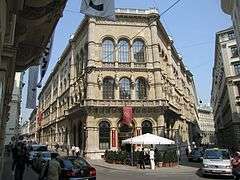Café Central
Café Central is a traditional Viennese café located at Herrengasse 14 in the Innere Stadt first district of Vienna, Austria. The café occupies the ground floor of the former Bank and Stockmarket Building, today called the Palais Ferstel after its architect Heinrich von Ferstel.[1]
| Café Central | |
|---|---|
 Cafe Central in Vienna, Austria | |
 Café Central Location within Austria | |
| General information | |
| Address | Herrengasse 14, Innere Stadt first district of Vienna, Austria |
| Coordinates | 48°12′37″N 16°21′55″E |
| Opened | 1876 |
History
The café was opened in 1876, and in the late 19th century it became a key meeting place of the Viennese intellectual scene. Key regulars included: Peter Altenberg, Theodor Herzl, Alfred Adler,[2] Egon Friedell, Hugo von Hofmannsthal, Anton Kuh, Adolf Loos, Leo Perutz, Robert Musil, Stefan Zweig, Alfred Polgar, Adolf Hitler, and Leon Trotsky. In January 1913 alone, Josip Broz Tito, Sigmund Freud, and Trotsky (the latter being regular) were patrons of the establishment.
The café was often referred to as the "Chess school" (Die Schachhochschule) because of the presence of many chess players who used the first floor for their games.[3]
Members of the Vienna Circle of logical positivists held many meetings at the café[4] before and after World War I.
A well known story is that when Victor Adler objected to Count Berchtold, foreign minister of Austria-Hungary, that war would provoke revolution in Russia, even if not in the Habsburg monarchy, he replied: "And who will lead this revolution? Perhaps Mr. Bronstein (Leon Trotsky) sitting over there at the Cafe Central?"[5]
The café closed at the end of World War II. In 1975, the Palais Ferstel was renovated and the Central was newly opened, however in a different part of the building. In 1986, it was fully renovated once again.
Today it is both a tourist spot and a popular café marked by its place in literary history.
Gallery
- Cafe Central in Vienna interior near entrance with statue of Peter Altenberg
- Cafe Central in Vienna interior near portraits of Empress Elisabeth of Austria and Franz Joseph I of Austria
References in literature and popular culture
- The cafe appears in a pivotal scene in the 1998 novel The Magic Circle by Katherine Neville.
See also
References
- Marboe, Ernst Wolfgang (1989). Café Central. Vienna: Verlag Müller. ISBN 9783900784065.
- Hoffman, Edward (1994). The Drive for Self: Alfred Adler and the founding of Individual Psychology. Reading, MA: Addison Wesley, pp. 52, 77, 85-86, 101
- Skjoldager, Per; Nielsen, Jørn Erik (2012). Aron Nimzowitsch: On the Road to Chess Mastery, 1886-1924. McFarland. p. 29. ISBN 978-0-7864-6539-2.
- Stadler, Friedrich (2015). The Vienna Circle: Studies in the Origins, Development, and Influence of Logical Empiricism. Springer. p. 370. ISBN 978-3-319-16561-5.
- A. J. P. Taylor, in The Struggle for Mastery in Europe 1848-1918 (1980)